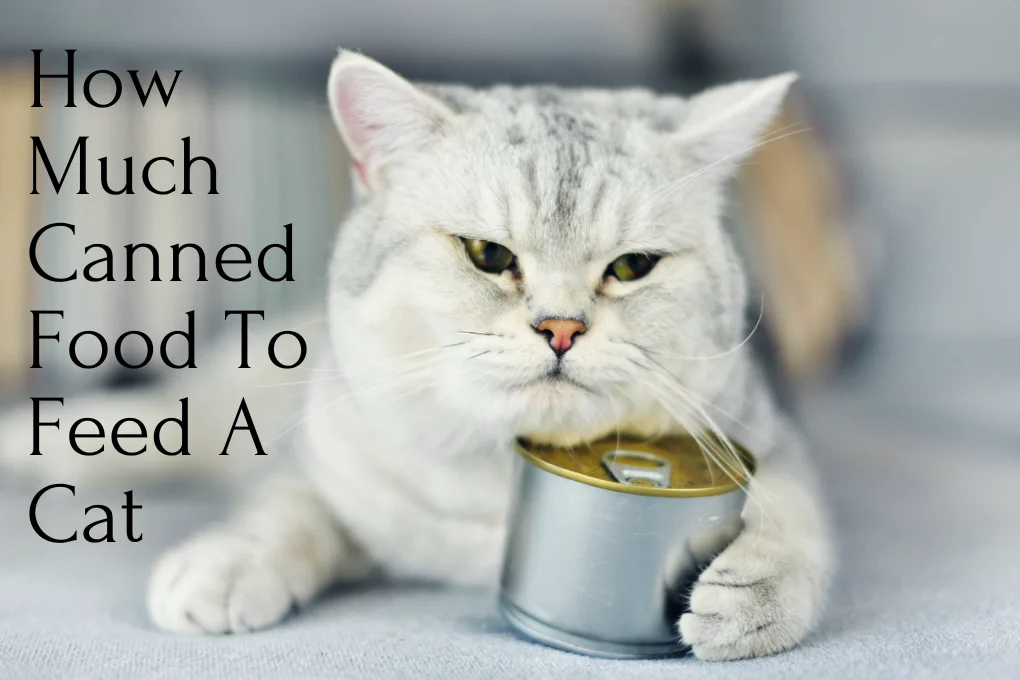Welcome to my blog, fellow pet lovers! Today, let’s delve into the important topic of how much canned food to feed a cat.
As a passionate pet enthusiast, I understand the significance of providing our feline companions with a balanced and nutritious diet.
It is crucial to find the right amount of canned food that meets their dietary requirements while keeping them healthy and happy.
As a passionate pet enthusiast, I’m excited to share valuable insights on determining the ideal amount of canned food to nourish your cat.
In this article, I will guide you through the factors to consider and help you calculate the appropriate quantity of canned food for your singular cat’s nutritional needs. Let’s get started!
Table of Contents
Understanding Your Cat’s Nutritional Needs
It’s crucial to comprehend your cat’s nutritional requirements before deciding how much canned food to feed it. Being obligate carnivores, cats need a diet full of animal protein.
They also need essential nutrients like taurine, vitamins, and minerals. Reading the labels on a canned cat food can help you ensure it meets these requirements.

Determining the Right Amount of Canned Food
The quantity of canned food to feed your cat will vary depending on their age, weight, degree of activity, and general health.
In general, it’s advised to start by adhering to the feeding instructions provided by the cat food producer. These guidelines usually indicate the daily portion based on your cat’s weight.
Why Do Cats Need Canned Food?
Cats need canned food because it provides them with essential hydration and a balanced diet. Canned food has higher moisture content, which helps prevent dehydration in cats, especially those who don’t drink much water.
Additionally, it contains quality protein sources and vital nutrients that contribute to their overall health and well-being.
How Much Canned Food To Feed A Cat?
There are a few crucial elements to consider when choosing how much canned food to feed your cat.
The amount will vary depending on the age, weight, state of health, level of activity, and particular brand and formulation of canned food you are using for your cat.
Providing kittens with enough nutrients is crucial for their growth and development. Generally, they require more food compared to adult cats.
It is advised to give kittens two to three little meals per day, each of which should contain about a quarter to a third cup of canned food.
Adult cats, on the other hand, have different dietary needs. The amount of canned food they require will depend on their weight and activity level.
On average, a healthy adult cat weighing around 8-10 pounds will need approximately 4-6 ounces (113-170 grams) of canned food per day.
This can be divided into two meals, morning and evening, each consisting of 2-3 ounces (57-85 grams) of canned food.
Senior cats may require adjustments to their feeding routine. Some senior cats may have decreased appetites or health issues that affect their dietary needs.
It’s essential to consult with your veterinarian to determine the appropriate amount of canned food to feed your senior cat based on their specific condition.
Remember, these are general guidelines, and it’s important to monitor your cat’s weight and adjust the serving size accordingly.
If your cat starts gaining or losing weight, you may need to adjust the amount of canned food you provide.
Always check the feeding guidelines on the canned food label, as different brands and formulations may have varying recommendations. Additionally, ensure your cat has access to fresh water to stay hydrated.
By considering your cat’s individual needs and following these guidelines, you can provide them with the appropriate amount of canned food to keep them healthy and satisfied.
However, it’s important to note that every cat is unique, so consulting with your veterinarian for personalized advice is always a good idea.
Why should cats be fed canned food?
Cats should be fed canned food for the best 6 reasons:
1. Adequate hydration
Canned food has a high moisture content, which helps ensure cats stay well-hydrated. Since cats have a low thirst drive, they often don’t drink enough water when consuming dry food alone. Canned food helps increase their water intake, promoting urinary tract health and preventing dehydration.
2. Nutritional balance
High-quality canned cat foods are formulated to provide a complete and balanced diet. They have vital vitamins, minerals, and nutrients cats require for good health.
Canned foods often have a higher meat content, which aligns with a cat’s natural carnivorous diet and provides the necessary protein they require.
3. Enhanced palatability
Cats are known for their discerning palates; many find canned food more appealing in taste and texture. Canned food’s aroma and moist consistency can entice even picky eaters, ensuring they consume adequate food to meet their nutritional needs.
4. Digestive Health
Canned food is typically easier for cats to digest than dry food. The moisture content and soft texture of canned food can be gentler on a cat’s digestive system, particularly for cats with dental issues, older cats, or those prone to constipation.
5. Weight management
Canned food can be beneficial for weight management in cats. It allows for better portion control, making it easier to regulate calorie intake.
Since canned food is more filling due to its higher water content, it can help cats feel satisfied with smaller portions, reducing the risk of overeating and weight gain.
6. Medical conditions
In certain medical conditions such as urinary tract issues, diabetes, or gastrointestinal sensitivities, veterinarians often recommend a canned food diet.
The moisture content and specialized formulations of some canned foods can assist in managing these conditions effectively.
It’s crucial to remember that each cat may have different dietary needs. Therefore finding the best food for your cat’s requirements requires speaking with a veterinarian.
How to Choose a High-Quality canned cat food?”
The best canned cat food is essential for giving your feline friend nutrition. The following crucial considerations should be kept in mind while selecting the best canned cat food for your pet:
Signature Select Wet Cat Canned Variety Pack

Check The Latest Price On Amazon
Read the Ingredients
Look carefully at the cat food label’s ingredient list. Check the ingredients list for sources of high-quality protein such as actual meat (such as chicken, turkey, or fish) that are listed first. Products with fillers, byproducts, or artificial additions should be avoided.
Consider the Nutritional Content
Ensure the canned cat food provides a well-balanced diet. Consider finding necessary nutrients including proteins, good fats, vitamins, and minerals.
Ideally, it should meet the nutritional requirements recommended by recognized pet food associations or regulatory bodies.
Life Stage and Health Considerations
Consider your cat’s life stage and any specific health concerns they may have. Kittens, adult cats, and seniors have different dietary needs. If your cat has specific your veterinarian for specialized formulas recommendations on specialized formulas.
Look for Complete and Balanced Formulations
Opt for cat food that is labeled as “complete and balanced.” This indicates that the food meets the minimum nutrient requirements established by regulatory bodies.
Check for AAFCO Statement
Look for the cat food label statement indicating that the product has undergone feeding trials or meets the standards set by the Association of American Feed Control Officials. This helps ensure the food is nutritionally adequate.
Consider Your Cat’s Preferences
While Nutro choosing also important to choose a canned cat f is also important food that your cat enjoys. Some cats may have specific taste preferences, so finding a flavor or texture they like can help ensure they eat well.
Seek Recommendations and Research
Consult with your veterinarian or other trusted sources, such as reputable pet food websites or forums, for recommendations and reviews on high-quality canned cat food brands. Reading customer reviews can also provide insights into other cat owners’ experiences.
To locate the ideal canned cat food that satisfies both their nutritional demands and taste preferences, keep in mind that each cat is unique, so that it could take some trial and error.
Monitoring your cat’s health, weight, and overall well-being is critical, and if you notice any problems, get advice from your veterinarian.
Tips for Feeding Canned Food to Multiple Cats
If you have multiple cats, monitoring their food intake individually is important. Some cats may eat more quickly or try to steal food from others.
Separate them during mealtimes or use feeding stations to ensure each cat receives the appropriate amount of food.
FAQs
How often should I feed my cat canned food?
Kittens should be fed three to four times a day, while adult cats typically require two meals per day.
How much canned food should I feed my cat?
The amount of canned food depends on your cat’s weight, with a general guideline of 20 to 25 calories per pound of body weight.
Can I mix canned and dry food for my cat?
Yes, you can mix canned and dry food to provide variety and meet your cat’s nutritional needs. Follow the appropriate portion sizes for each.
What if my cat doesn’t finish their canned food?
If your cat consistently leaves food behind, reduce the portion size to avoid overfeeding.
Can I feed the same canned food to my senior cat?
Senior cats may have specific dietary requirements. Consult with your veterinarian to determine if a senior-specific formula is necessary.
Conclusion
How Much Canned Food To Feed A Cat? Your cat’s general health and wellbeing need to feed them the proper amount of canned food. Consider their age, weight, and nutritional requirements when determining the portion size.
Monitor their weight and adjust accordingly to maintain an ideal body condition. Your cat can live a long and healthy life if you provide balanced and suitable food.
Providing kittens with sufficient nutrients for growth and development is essential. Adult cats require portion sizes based on their weight and activity level, while senior cats may have specific needs that require adjustments to their feeding routine.
Remember to consult the feeding guidelines on the canned food label, as different brands and formulations may have varying recommendations.
Monitoring your cat’s weight and adjusting the serving size is important to prevent overfeeding or underfeeding.
So, take the time to assess your cat’s unique requirements and provide them with the optimal amount of canned food for a thriving and contented feline companion.

Hi there! My name is Koushik; I am a cat lover. I specialize in writing about pet care & food. I have a wealth of knowledge on cat food niches and related subjects. I have worked in the pet industry for over 5 years and am passionate about helping cat owners provide the best care for their furry friends. With knowledge of cat food and nutrition, I aim to share their insights and help cat owners navigate the world of cat food niches. I enjoy playing with my two cats, reading, and exploring new cat food brands in my free time.